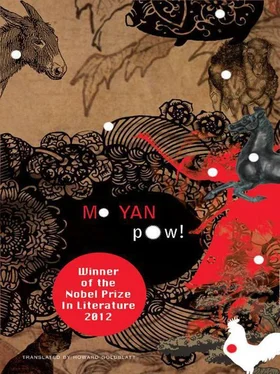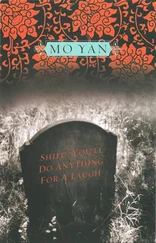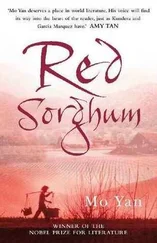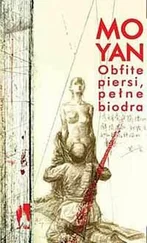Mo Yan
OW!
Translated by Howard Goldblatt
Wise Monk, where I come from people call children who boast and lie a lot ‘Powboys’, but every word in what I'm telling you is the unvarnished truth.
Ten years ago, a winter morning; a winter morning ten years ago—what times were those? ‘How old are you?’ asks Wise Monk Lan, who has roamed the four corners of the earth, his whereabouts always a mystery, but who is, for the moment, living in an abandoned little temple. His eyes are open, his voice seems to emerge from a dark hole in the earth. I shudder on that hot, humid day in the seventh lunar month. ‘It was 1990, Wise Monk, and I was ten,’ I reply, muttering in a changed tone of voice. We are in a Wutong Temple located between two bustling mid-size cities, built, as the story goes, with funds supplied by an ancestor of the village head, Lao Lan. Although it nestles up to a well-travelled highway, few people come here to burn incense; visitors are a rarity to this building with its musty, outdated aura. A woman in a green overcoat, her hair pinned behind one ear with a red flower, sprawls through a breach in the temple wall that appears to have been opened up for easy access. All I can see of her are a round, pasty face and the fair hand with which she props up her chin. In the bright sunlight, the rings on her fingers nearly blind me. She calls to mind the big house, with its tiled roof, that once belonged to the large landowners of the Lan clan but which was converted into an elementary school during the Republican era. In many legends and the fantasies evolving out of them, women like her were often seen entering and leaving that increasingly dilapidated house in the middle of the night, their skin-crawling screams enough to make a person's heart stop. The Wise Monk sits in the lotus position on a rotting rush mat in front of an ugly, crumbling Wutong Spirit idol, as serene as a sleeping horse. Wearing a cassock that looks like it's made of rain-soaked toilet paper, which will crumble at the slightest touch, he fingers a string of purple prayer beads. Flies have settled on the Wise Monk's earlobes, but none on his shaved head or oily face. Singing birds perch on the branches of a huge gingko tree out in the yard; there are cat yowls in the chorus too—the cries of a pair of feral cats that sleep in a hollow of the tree and snatch the birds off its limbs. A particularly self-satisfied yowl enters the temple, followed a mere second later by the pitiful screech of a bird, and then the flapping of wings as a panicky flock takes to the sky. I don't so much smell the stench of blood as imagine it; I don't so much see the feathers fly and the blood-stained limbs as conjure up the image. The male cat is pressing its claws into its prey and trying to court favour with the tailless female. That missing tail makes her look three parts cat and seven parts fat rabbit. After answering the Wise Monk's questions, I wait for him to ask more; but before I've finished, his eyes are shut and I wonder if his questions have been figments of my imagination, if I've only imagined him snapping his eyes open and emitting that penetrating gaze. Now his eyes are half shut, and the sheaves of nose hair that clear his nostrils by at least an inch twitch like crickets’ tails. The sight calls to mind an image from more than ten years before, of our village head, Lao Lan, manicuring his nose hairs with comically small scissors. Lao Lan is the male descendant of the Lan clan, which has produced many prominent individuals: a Provincial Scholar during the Ming, a Hanlin Scholar during the Qing and a General during the Republic. After the Communists seized power, the clan produced a slew of landlord-counterrevolutionaries. By the time the class-struggle campaigns had ended, very few of them remained but those who did rose from the ashes, slowly, and produced Lao Lan, our village head. As a child, I often heard Lao Lan sigh: ‘Each generation is worse than the one before!’ And I heard Lao Meng, a villager who could read, say: ‘One crab's worse than the last. The Lan clan's feng shui has lost its power.’ One of the clan's cowherds, Lao Meng had been witness to the family's lavish lifestyle as a child. Pointing to Lao Lan's retreating back, he'd hiss: ‘You're not the damned equal of one of your ancestors’ cock hairs!’ A cold cinder that has risen from the temple roof floats down, like a piece of early spring poplar fluff, to settle lightly on the Wise Monk's shaved head. Then another, its sister, does the same, settling lightly on his head and emanating a subtle, timeless aura that embodies a hidden flirtation. Scars from twelve burning incense sticks adorn his head in a bright pattern, investing it with extraordinary solemnity. Those are signs of honour for true monks, and in the hope that one day I too will possess twelve identical scars, Wise Monk, please let me continue—
My home, a big house with a tiled roof, was so cold and dank that the walls were covered by a layer of frost and my breath left a film, like fine salt, atop the blanket as I slept. They'd finished building the house in time for the first day of winter, and we moved in before the plaster on the walls was dry. After Mother got out of bed, I scrunched down under the covers to escape the cold air knifing into the room. Ever since my father ran off with his slut, Mother was determined to be a strong woman and make a living through her own hard work. Five years passed like a single day and, thanks to that hard work and her native intelligence, she'd put aside enough to build the tallest and sturdiest five-room, tiled house in the village. Any mention of my mother gave voice to the respect in which she was held by all the villagers—they called her a fine example of womanhood. And when they praised her they never forgot to criticize my father. When I was a boy of five, he ran off with a woman known in the village as Wild Mule; where they went no one knew.
‘Predestined relationships exist everywhere,’ the Wise Monk mutters, as if talking in his sleep, an indication that, even though his eyes are shut, he is paying attention to my story. The woman in the green dress and the red flower behind her ear is still sprawled in the breach in the wall. She fascinates me but I cannot tell if she knows that. The powerful feral cat, a pretty green bird in its mouth, glides up to the temple door like a hunter parading a trophy. It stops in the doorway and, cocking its head, tosses a glance at us, its expression like that of a curious schoolboy—
Five years passed and, while we received no reliable news, rumours about Father and Aunty Wild Mule came every now and then, like the beef cattle that arrived at our tiny station on the local freight train, that were then slowly herded into the village by the yellow-eyed beef merchants and then finally sold to the village butchers (our village was in truth a glorified slaughterhouse). Rumours swirled round the village, like grey birds wheeling in the sky. Some had it that Father had taken Aunty Wild Mule into the great forests of the northeast, where they'd built a cabin out of birch logs, complete with a big oven in which they burnt crackling pine kindling. Snow covered the roof, hot chilli peppers were strung on the walls and sparkling icicles hung from the eaves. They hunted game and gathered ginseng by day and cooked venison at night. In my imagination, the faces of Father and Aunty Wild Mule reflected the burning fire, as if coated with a red glaze. Others claimed that Father and Wild Mule, wrapped in bulky Mongolian robes, roamed the remote stretches of Inner Mongolia. During the day, they rode their horses, sang shepherds’ songs and tended herds of cattle and sheep on the vast grassland; at night, they slipped into their yurt and made a fire with cow chips over which they hung a steel pot. The fatty stewing lamb entered their nostrils on the wings of its fragrance, and they washed the meat down with thick milky tea. In my imagination, Aunty Wild Mule's eyes sparkled, like black onyx, in the light of the cow-chip fire. Yet another rumour alleged that they'd secretly crossed the border into North Korea and opened a little restaurant in a little border town. During the day they made meat-filled dumplings and rolled noodles to feed the Koreans; at night, after the restaurant closed, they cooked a pot of dog meat and opened a bowl of strong white liquor. Each of them held a dog's leg—two legs out of the pot, and two more inside—with its bewitching aroma, waiting to be eaten. In my imagination, they both hold a fatty dog's leg in one hand and a glass of strong liquor in the other, and alternate between drinking and eating, their cheeks bulging like oily little balls…of course, I also think about what happens after the eating and drinking, how they wrap their arms round each other and do you know what—
Читать дальше












